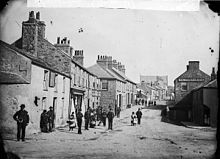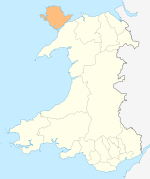Llangefni
| Llangefni | |
|---|---|
 Llangefni clock tower | |
 Llangefni Location within Anglesey | |
| Population | 5,116 2011 Census[1] |
| OS grid reference | SH4675 |
| Principal area | |
| Ceremonial county | |
| Country | Wales |
| Sovereign state | United Kingdom |
| Post town | Llangefni |
| Postcode district | LL77 |
| Dialling code | 01248 |
| Police | North Wales |
| Fire | North Wales |
| Ambulance | Welsh |
| UK Parliament | |
| Senedd Cymru – Welsh Parliament | |
Llangefni (meaning "church on the River Cefni",[2] Welsh pronunciation: [ɬaŋˈɡɛvni]) is the county town[3] of Anglesey in Wales and contains the principal offices of the Isle of Anglesey County Council. United Kingdom Census 2011 recorded Llangefni's population as 5,116 people, making it the second largest settlement in the county.[1] The community includes the village of Rhosmeirch.
Location[]
The town is near the centre of Anglesey, and is on the River Cefni, after which it is named. Its attractions include the Oriel Ynys Môn museum, which details the history of Anglesey and houses collections of the painters Kyffin Williams and Charles Tunnicliffe. In the west of the town is a large secondary school, Ysgol Gyfun Llangefni (Llangefni Comprehensive School), and in the north a Victorian parish church, St Cyngar's, set in a wooded riverside location called the Dingle. The town was formerly named Llangyngar, Welsh for "St Cyngar's church".
Commerce, transport and education[]


Llangefni is a commercial and farming town in Anglesey and once hosted the largest cattle market on the island. There is a relatively large industrial estate, which includes a large chicken processing plant, the largest single industrial operation in the town, as well as several other small businesses.
The town had a station on the Anglesey Central Railway line which opened in 1864. It closed in 1964, although goods trains continued to pass through the town until 1993. Although no longer used, the railway tracks have not been removed. The nearest station is now at Llanfairpwllgwyngyll, 5 miles (8 km) away as the crow flies. There are frequent buses to the larger settlements of Bangor and Holyhead as well as to the smaller towns of Amlwch and Beaumaris. By road the town is just 2 kilometres from the major A55 and A5 roads, via the short A5114. Water for the town comes from Llyn Cefni, a reservoir 1.5 miles (2.4 km) to the northwest.
Llangefni hosted the National Eisteddfod in 1957 and 1983, and in 1999 gave its name to the Eisteddfod held at the nearby village of Llanbedrgoch. It also hosted the Urdd Eisteddfod (youth Eisteddfod) in 2004. The town also has a college, Coleg Menai (Llangefni site).
Sport[]
The local association football club, Llangefni Town, was promoted to the Welsh Premier League at the end of the 2006–07 season, but relegated one season later.
The local rugby club is Llangefni RFC, which plays in the WRU leagues. The club recently gained promotion to Division 2 West, but the WRU then decided to demote the club back to Division 4 North Wales league.[4]
Welsh language skills[]
According to the 2011 Census, Llangefni is the community with the highest percentage of Welsh speakers on the Isle of Anglesey, and the 6th highest in Wales. 80.7% of residents aged three and over reported being able to speak Welsh in the 2011 Census, as compared to 83.8% reporting being able to do so in the 2001 Census.[5] 91.6% of those born in Wales could speak Welsh.
Governance[]
Llangefni is in the Canolbarth Môn electoral ward which also includes four other neighbouring communities in the centre of the island, electing three county councillors to the Isle of Anglesey County Council.[6] Prior to the 2012 Anglesey electoral boundary changes the town was represented by three county councillors elected from three wards, Cefni, Cyngar and Tudur.
Cefni, Cyngar and Tudur remain as community wards, electing the thirteen community councillors to , the community council of the town.[7]
The county administration took place in Llangefni Town Hall from 1895 until 1974. The County Council offices are still located in the town.
Notable people[]

- John Elias, preacher, lived in the town 1830–41
- Christmas Evans, preacher and chapel builder, lived in the town 1791–1826
- Huw Garmon, actor
- Hugh Griffith, Oscar‑winning actor, attended Llangefni County School in his youth
- Hywel Gwynfryn, television and radio personality, was born in the town in 1942 and studied at Ysgol Gyfun Llangefni
- Wayne Hennessey, Wolverhampton Wanderers and Wales goalkeeper
- Naomi Watts, Oscar‑nominated actress, lived in the town between the ages of 7 and 10
- Kyffin Williams, painter, was born in the town in 1918
- Gabriel Fielding, author, attended Llangefni County School, in 1934
References[]
- ^ Jump up to: a b "Area: Llangefni (Parish) Key Figures for 2011 Census: Key Statistics". Neighbourhood Statistics. Office for National Statistics. Retrieved 19 June 2011.
- ^ Mills, A. D. (2003). A Dictionary of British Place-Names. Oxford: Oxford University Press. ISBN 9780198527589.
- ^ Davies, John; Jenkins, Nigel; Baines, Menna; Llynch, Peredur (2008). The Welsh Academy Encyclopaedia of Wales. Cardiff: University of Wales Press. p. 494. ISBN 978-0-7083-1953-6.
- ^ "Llangefni fight WRU 'relegation'". BBC News. 18 May 2007. Retrieved 20 August 2007.
- ^ "2011 Census results by Community". Welsh Language Commissioner. Archived from the original on 14 September 2017. Retrieved 9 April 2016.
- ^ "Isle of Anglesey (Electoral Arrangements) Order 2012" (PDF). legislation.gov.uk. The National Archives. Retrieved 4 December 2017.
- ^ "Council & Projects". Llangefni.org. Retrieved 4 December 2017.
External links[]
| Wikimedia Commons has media related to Llangefni. |
| Wikivoyage has a travel guide for Llangefni. |
- Llangefni
- Towns in Anglesey
- County towns in Wales


